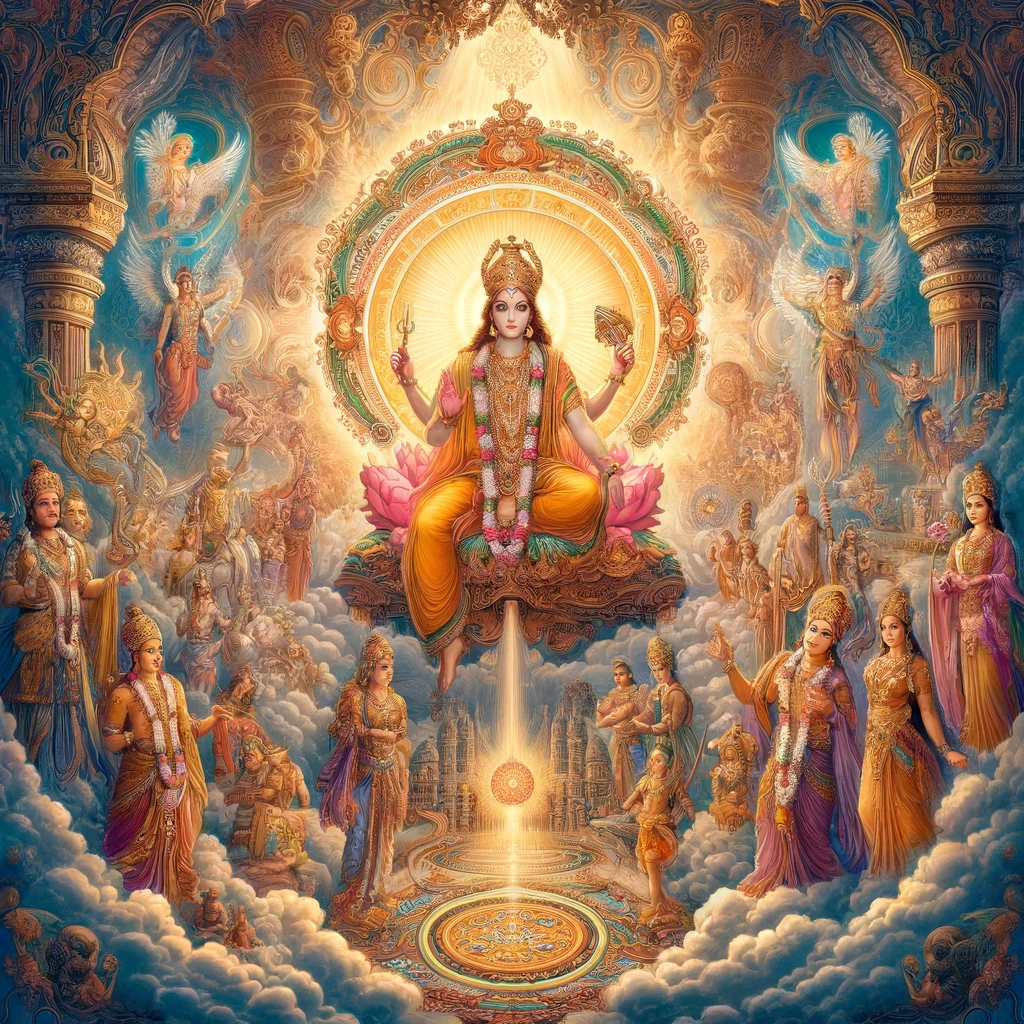ಮಹೇಷ್ವಾಸಃ ಮಹೀಭರ್ತಾ ಶ್ರೀನಿವಾಸಃ ಸತಾಂಗತಿಃ
ಅನಿರುದ್ಧಃ ಸುರಾನಂದೋ ಗೋವಿಂದೋ ಗೋವಿದಾಂಪತಿಃ || ೨೦ ||
maheṣvāsaḥ mahībhartā śrīnivāsaḥ satāṃgatiḥ
aniruddhaḥ surānaṃdo goviṃdo govidāṃpatiḥ || 20 ||
maheṣvāsaḥ
Maheshvasa (Maha+Ishu+Aasa) means the great wielder of the bow. In the context of the divine incarnation, we see several instances related to this name. During Sita's swayamvara, Lord Rama broke Shiva's bow, and during the Bilva festival, Lord Krishna broke Shiva's bow, which was being worshipped by King Kansa. Lord Rama, after receiving the Vaishnava bow from Parashurama, used it to destroy Ravana and Kumbhakarna. These are some examples.
In these instances, how did anyone manage to lift the Shiva bow, which could not be lifted by anyone else? How big was that bow? Such questions arise in our minds. Although the bow was ordinary in appearance, because it housed the power of Lord Shiva, it was impossible for anyone to lift it. As mentioned before, Shiva's power and Vishnu's power are like the milk in a vessel, two powers interdependent on each other. The act of wielding the bow signifies the convergence of these powers.
In this way, Maheshvasa, the one who broke the great bow, the one who wielded the great bow and annihilated evil forces, who resided within Arjuna as the name Narayana, and established righteousness through the Gandiva bow, is the divine incarnation known as Maheshvasa.
mahībhartā
Here, "Mahi" refers to the Earth or the planet. "Bharta" means the one who supports or the husband.
They refer to the Lord as the husband of Mother Earth. He is called the husband or the constant supporter of this Earth by holding it firmly through the force of gravitation. Thus, He is known as Mahibharta.
śrīnivāsaḥ
In this context, "Shri" refers to auspiciousness, wealth, Mother Lakshmi, Vedic knowledge, and so on. The Lord constantly holds Mother Shri Lakshmi in His heart. He is the abode of all riches and invaluable Vedic knowledge. The Lord is known as Shri Nivasah, the eternal abode of prosperity and auspiciousness.
satāṃgatiḥ
The Lord is always the refuge for the virtuous and the righteous. The auspicious path is attained by those who seek refuge in the Lord.
The Lord is the refuge for everyone, but the awareness of seeking refuge exists only in the minds of the righteous. Awareness is essential. Without the awareness of seeking refuge, we live in the fear of impurity. However, the wise constantly experience the shelter of the Lord. With unwavering faith in the presence of the Lord, they live joyfully, regardless of what comes their way.
aniruddhaḥ
Previously, we have analyzed the four forms of the Lord's divine manifestation. At the beginning of creation, the Lord manifests in four forms representing four actions. They are Vasudeva, Sankarshana, Pradyumna, and Aniruddha. Vasudeva represents the form of liberation, Sankarshana represents the form of destruction, Pradyumna represents the form of creation, and Aniruddha represents the form of maintenance. The form of Aniruddha is the cause for the state of the world or its preservation. The Lord assumed the form of Aniruddha to sustain and protect the world. It is the form of the Lord that upholds the external consciousness without being influenced by it and experiences the external consciousness. It is the form of Aniruddha that is beyond any limitation. Similarly, the cause of the movement of the five vital forces in our body is the infinite power of the Lord.
surānaṃdo
The term "suraru" refers to celestial beings or deities. Among the deities, the Lord is the one who bestows upon them constant blissful joy without any touch of sorrow. The Lord, known as Suranandha, provides joy to the liberated souls and those worthy of liberation.
goviṃdo
In a state of alertness, sitting as the third eye on our command wheel, is the divine form of Govinda. It possesses the power to guide us from within. Therefore, in the morning, we offer the prayer "Uttisthottistha Govinda Uttistha Garudadhwaja," which means "Arise, O Govinda, arise, O bearer of the Garuda flag, and guide us on our path." During mealtime, we remember the name "Govinda" to awaken our inner consciousness. The term "Govinda" is used to refer to the Lord who lifted the Indra-Govardhana mountain. Govinda, in His infinite form, descended upon the Earth as a protector.
govidāṃpatiḥ
The one who knows the Vedas, the one who imparts the knowledge of the Vedas, is the Lord Govindapati, the ruler of the gods.


